CLAS 355
Senecan Tragedy (Trojan Women)
March 28, 2023

Pio Fedi, The Rape of Polyxena, ca. 1860
GROUP PRESENTATIONS: Thursday, March 30 & Tuesday, April 4 (15 mins. per group); comparative analysis (similarities & differences) of a modern HTVT topic versus some course material; Presentation Guide
Course Units/Areas for Possible Presentation Topics:
Part I: Everyday Horror, Terror, Violence & Trauma - Roman Slavery, e.g. comparative study of some aspect of American or another historical instance of slavery with Roman material (e.g. violence & punishment, manumission & freedpersons, rebellions, deracination, markets, labor, paternalism & nostalgia, creative resistance, etc.); slavery in film & television, etc. (historical/legal or thematic)
Part II:
Cultural Catastrophe: Epic Trauma & Memory of Civil War (as represented in Lucan), e.g. comparative analysis of a film or television show about civil war or some other fracturing of society, or a traumatic cultural memory
Part III: The Terror of Autocracy - Roman Emperors, e.g. comparative study of a historical or contemporary autocrat or autocratic personality with Nero or Caligula, life under autocracy (real or fictional)
Part IV: Spectacles of Violence - Theater & Amphitheater, e.g. comparative analysis of some aspect of HTVT in modern entertainment with Roman spectacles (gladiators, etc.) and public executions; film, television show, etc., with Senecan themes (violent family dysfunction, destructive emotional extremes, war's non-combatants)
GROUPS
Seneca, Medea (cont.): angry Medea's dehumanization of children (implicated in crime against royal family, 844ff.); arithmetic of revenge, "Children—once my children— / you must give yourselves as payback for your father's crimes", 923-4
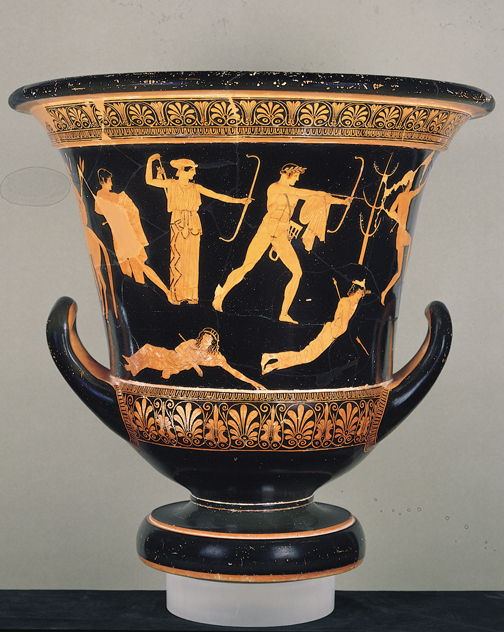
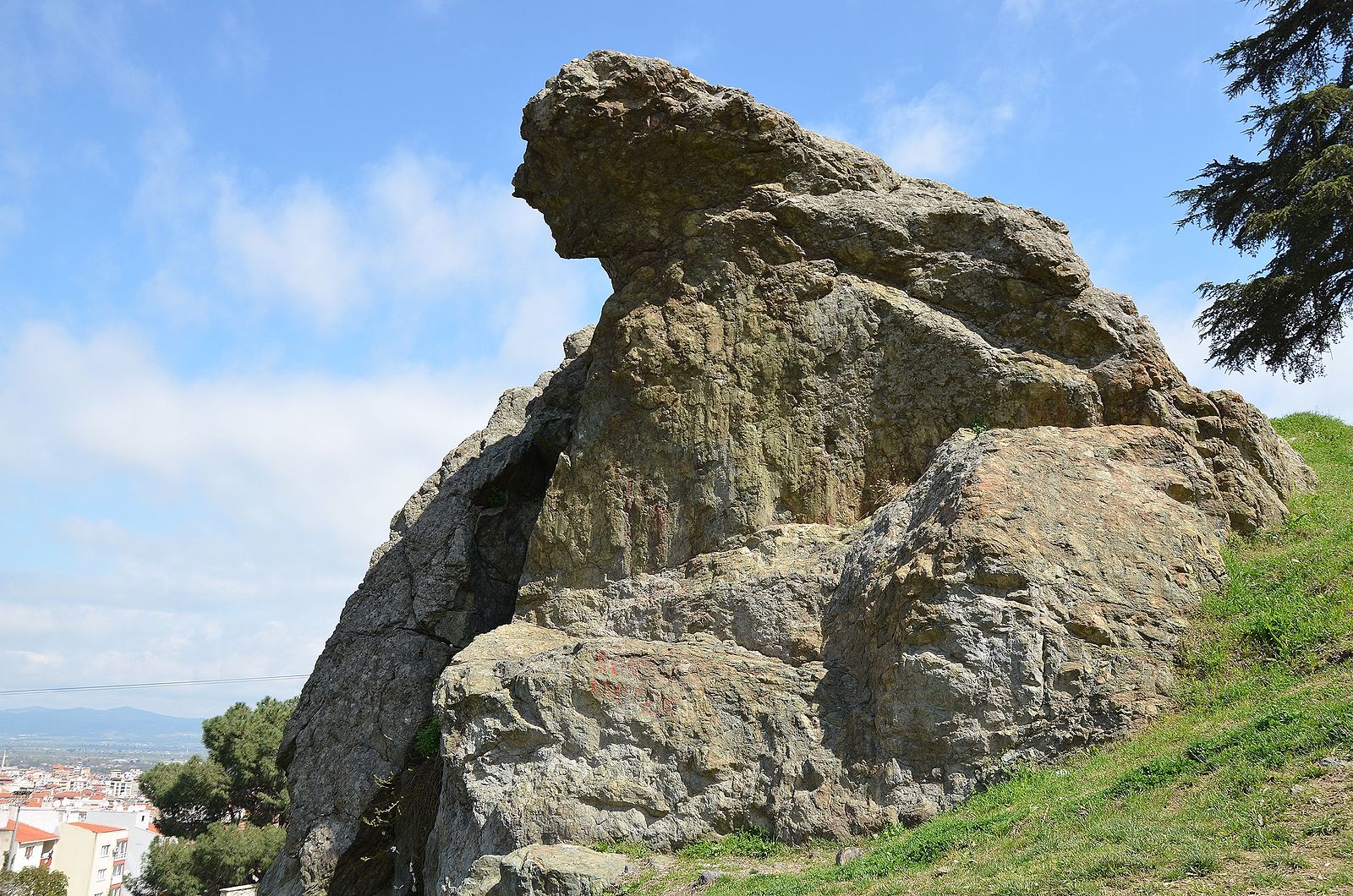
L: Death of Niobids, Attic red-figure, ca. 450 BCE; Mount Sipylus/Spil Dağı ("The Weeping Rock"), Turkey
Medea 954-957 (Medea is resolved to kill children)
I wish as many children as proud Niobe bore
had come from my womb, I wish I had
twice-seven sons! I was infertile for revenge:
but my two are just enough to pay for brother and father.
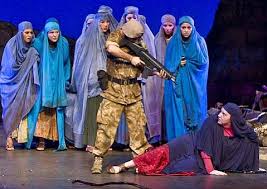
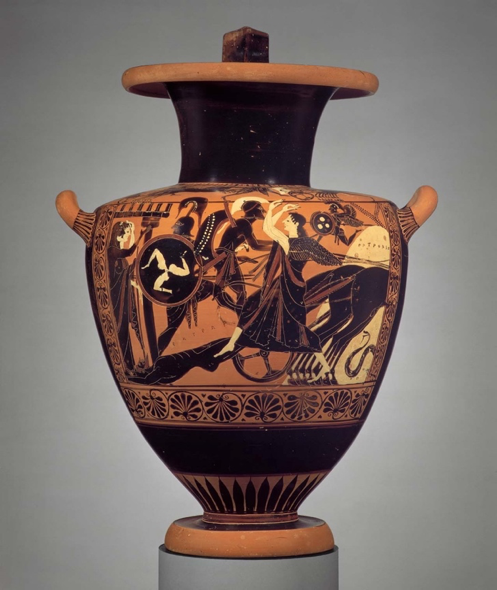
L: UCSB production of Trojan Women, 2010; R: Achilles dragging Hector, Attic Hydria, 520-500 BCE
Seneca, Trojan Women: trauma of a fallen city; war's non-combat victims (esp. Hecuba, Andromache)
- Hecuba: survivor's guilt ("this fire is mine. O Troy, my marriage torch burnt you", 40; cf. "Other people suffer singly; I suffer mass destruction", 1061) & continuing traumas
- Chorus (Act 1): "We will follow our queen. / When it comes to grief, we know all about it", 81-2; collective ritual mourning for Hector & Priam; death as relief, "Lucky Priam. This is happiness: / to die in war and take away, with loss of self, / all other losses", 161-3
- Hecuba's long view of history: power's & empire's impermanence (cf. Thyestes 612, "every kingdom lies beneath another"); introduces tragic frame for inspiring fear, pity, empathy, humility
Trojan Women 1-6 (Fortune's uncertainty, history, and humility)
Do you believe in power? Do you rule a palace,
and are you not afraid of the fickle gods?
Are you naive enough to trust in happiness?
Then look at me, and at this city, Troy. Fortune
has never given greater proof that those who stand
proud, have no sure footing. The pillar of mighty Asia,
the glorious work of the gods, has toppled and lies on the ground.
- Act 2 (conflict): Talthybius's report of Achilles's ghost demanding Polyxena as his spoil of war + prophet Calchas's determination about Hector's son, Astyanax (Agamemnon and Pyrrhus debate morality of revenge)
Trojan Women 265-272 (Agamemnon rejects call to sacrifice Polyxena)
We Greeks stand at the height
from which Troy fell. I admit, sometimes I was
tyrannical, too proud, out of control.
My pride is humbled by the very thing
which would have puffed up others: Fortune's smile.
Priam, you make me proud, but also frightened.
Can I believe that royal power is anything
but an empty, gilded name, hair fettered with false beauty?
- humane Agamemnon's ("there is an etiquette to victory, a limit to defeat", 257) counter to pitiless Pyrrhus's assertion of (Roman) absolute power over POWS: "Conscience prevents the crimes that law allows :: Winners in war can do whatever they like. :: The man who may do the most should be the most restrained", 335-7
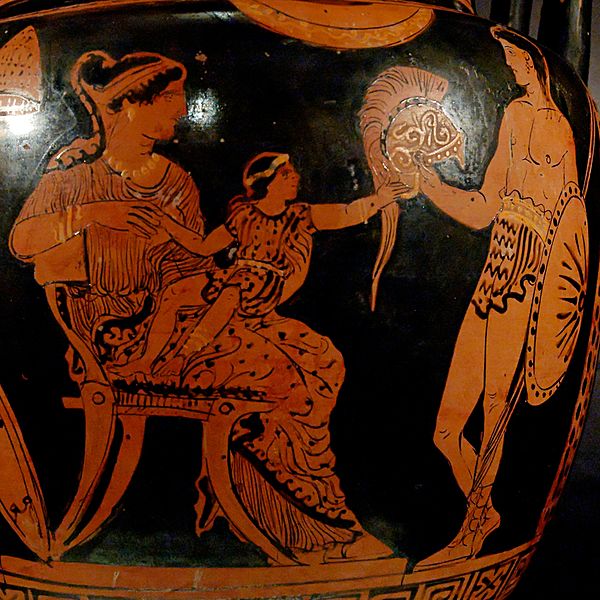
Andromache, Astyanax, Hector, Apulian vase, 370-360 BCE
- Andromache's trauma (onstage with Astyanax, Act 3): opens by diminishing chorus's grief ("For you, the fall of Troy only just happened", 412); "[since] that brute whipped his horses / to drag away my body . . . I am numb to suffering, I bear it without feeling", 413ff.; vision of Hector's warning about Astyanax, "Hide him . . . If only the whole city had been flattened", 452ff.
- Andromache's choice of Hector's tomb as hiding place ("Son, go up to the tomb. Why are you pulling back?", 503), patholology of conjugal devotion (loss of identity, distorted self, etc.)
- Ulysses claims Hector's ashes must be scattered (tomb razed)
Trojan Women 642ff. (Andromache's choice)
What am I to do? Fear pulls my heart two ways:
my son's life, or my dearest husband's ash.
Which part will win? Witness, you cruel gods
and you, my real god, spirit of my husband:
what I love in my son, Hector, is only you . . .
. . .Why do you hesitate?
Decide which one to save.
Bad wife, is it not
obvious? There is your Hector.
No, wrong! Both of them are Hector. This one has feelings;
maybe one day he will take revenge for his dead father.
Both of them have to be spared. But what can I do?
Protect, Andromache, the one whom the Greeks fear.
- Andromache's confession & pleas to Ulysses: "These tears go on forever / Seize her; she is holding up the Argive fleet", 812-13
- Act 5: Andromache (with Hecuba) demands account of double murder from Messenger ("Agony likes dragging out / every single wound", 1066-7)
- Astyanax's execution: the memory-laden tower ("a haunt of Priam's", 1068), last tower standing in Troy (symbolism?)
Trojan Women 1075-1087 (crowds gather for Astyanax's death)
This tower, once renowned, the glory of the wall,
is now a cruel crag, surrounded on all sides
by soldiers and their leaders. The whole rabble
assembled there, abandoning their ships.
Some went up a distant hill to get a better view,
others crowded to a high rock, on whose peak
they stretched up on their tiptoes, trying to see.
People climbed the trees: pine, laurel, and beech:
the whole wood quivered with suspended men.
Some chose the edge of a sheer mountain cliff,
while others perch on burned-out buildings, others on the rubble
of the ruined walls, and one man—what an obscenity!—
sits to watch—barbarian!—on Hector's tomb.
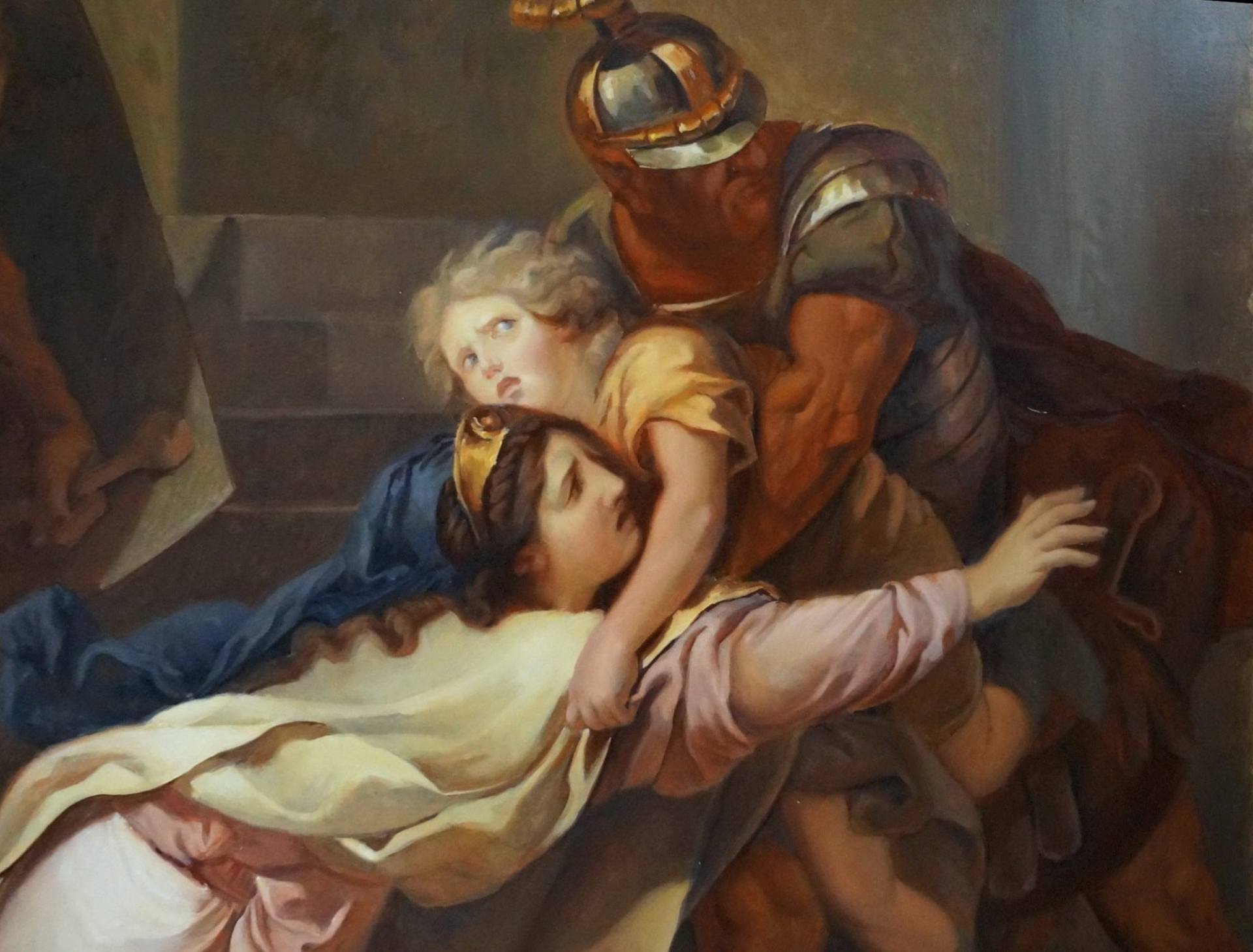
Doyen, The Young Astyanax, 1763
- Astyanax's Stoic suicide (cf. Seneca, Letter 70, German POW at spectacle; agency)
Trojan Women 1101ff. (Troy as a spectacle society)
While Ulysses performed the prophet's prayers,
and summoned savage gods, of his own free will
the boy jumped down to Priam's kingdom.
. . . His neck was snapped off as he hit the rock.
His head cracked open and the brains burst out.
His corpse is mangled, shapeless . . .
. . . When the boy toppled headlong from the walls,
Greeks wept to watch the crime they had done themselves,
then that same crowd turned back to further wickedness,
and to Achilles' tomb.
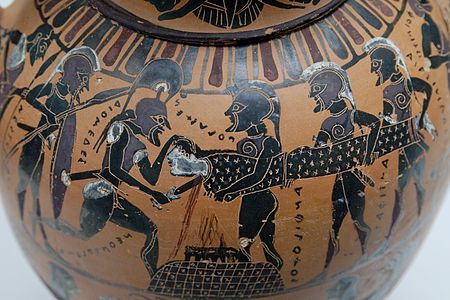
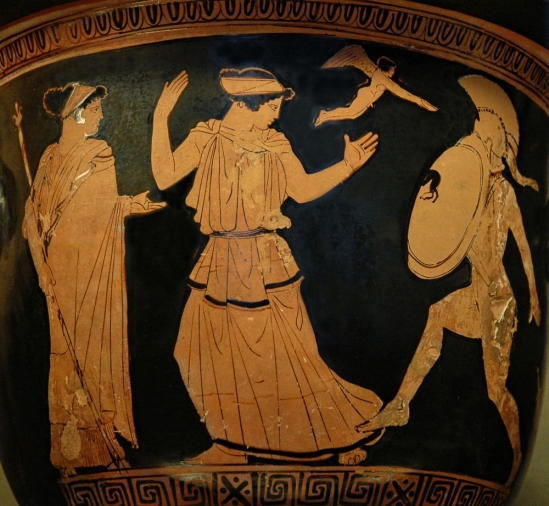
L: Sacrifice of Polyxena, Tyrrhenian amphora, 570-550 BCE; R: Helen & Menelaus, Athenian vase, 450-440 BCE
- Polyxena's wedding/funeral revealed by Helen ("Her great soul is glad to hear of her death", 945): virgin Polyxena sacrificed in setting "like a theatre", 1125
Trojan Women 1125-1132 (viewers gather for second spectacle-execution)
The whole shore thronged
with an enormous crowd. Some of them believe
this killing can set free the fleet from calm. Others
are happy at any enemy child mown down. But mostly,
the fickle mob hates the crime, but watches anyway.
Even the Trojans
crowd to see their own death, terrified
they watch the final scene of Troy's destruction:
when suddenly, as at a wedding, comes a
torchlit procession.

Detail of Polyxena Sarcophagus, 520-500 BCE, discovered in Turkey in 1994
- Polyxena's Stoic death
Trojan Women 1136ff. (crowd reacts variously in a theater of cruelty)
. . . Now horror
stuns both Greeks and Trojans. The girl looked down
modestly, but her cheeks were bright, and at the last
she was more beautiful than ever before . . .
. . . The whole crowd was dumbfounded: indeed, people
have more respect for things about to die. Some notice her beauty,
others her youth, while some are moved to think
of Fortune's mutability. All are affected
by her courage in meeting death. She walks before Pyrrhus.
Everybody quivers with pity and wonder. As soon as she reached
the top of the mound, and the young man stood up there
high on the top of his father's tomb, the brave young girl
did not step back. She stood there strong and fierce,
with a fixed frown as she turns to face the blow.
Everyone is moved to see such courage.

Frances O'Connor as Hecuba, Troy: Fall of a City (BBC miniseries, 2018)
- Hecuba's & play's final words, "I am the only one / feared and avoided by death", 1173-4; Messenger's call to the captive women (banality of evil); further traumas in Greece—Andromache? Hecuba?










